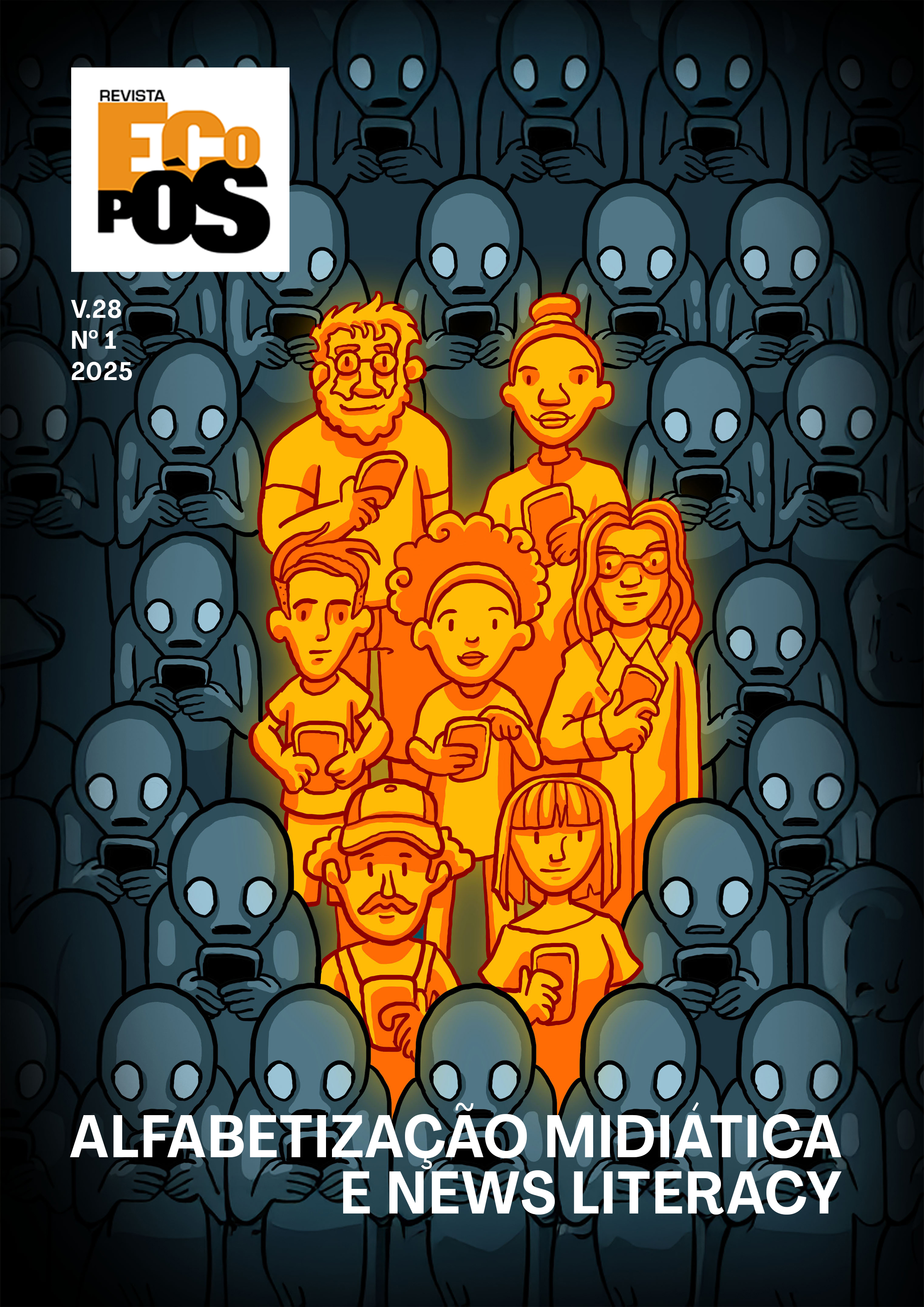Does it have a happy ending?
The relationship between literature and spoilers on TikTok
DOI:
https://doi.org/10.29146/eco-ps.v28i1.28269Keywords:
TikTok, BookTok, Spoiler, reading, booksAbstract
As in other social networks, TikTok has become a space for interaction and discussion among readers, forming a community known as BookTok. Considering an experience model based on algorithmic recommendation, observations on this platform reveal a practice that would typically be considered incompatible with reading habits: the prior revelation of narrative details and endings, known as spoilers. Therefore, this article aims to understand how the practice of spoilers is developed in the interaction among readers within the algorithmic environment of TikTok. To achieve this, we employ a methodology for app studies (walkthrough method) to explore the platform and make visible the content and relationships among readers around book spoilers. We demonstrate that this practice of spoilers becomes part of a filtering process for reading options, as well as constituting a significant factor in the experience and interaction among readers on TikTok.
Downloads
References
BHANDARI, A.; BIMO, S. Why’s Everyone on TikTok Now? The Algorithmized Self and the Future of Self-Making on Social Media. Social Media + Society, v. 8, n. 1, jan./2022, p. 1-11.
CALLON, M. Sociologie de l’acteur réseau. In: AKRICH, M.; CALLON, M.; LATOUR, B. (Eds.). Sociologie de La Traduction: Textes fondauters. Paris: Mines Paris Les Presses, 2006. p. 267–276.
DIJCK, J. VAN; POELL, T.; WAAL, M. D. The Platform Society. New York: Oxford University Press, 2018.
ERIKSSON-KRUTRÖK, M. Algorithmic Closeness in Mourning: Vernaculars of the Hashtag #grief on TikTok: Social Media + Society, v. 7, n. 3, set./2021.
FISCHER, G. D.; PALMA, G. R. #Challenge Memory Unlocked:: o TikTok como dispositivo construtor de memórias audiovisuais a partir da música. Revista Eco-Pós, v. 25, n. 1, jun./2022, p. 249–273.
GRAY, J. E. The geopolitics of ‘platforms’: The tiktok challenge. Internet Policy Review, v. 10, n. 2, 2021.
HAUTEA, S.; PARKS, P.; TAKAHASHI, B.; ZENG, J. Showing They Care (Or Don’t): Affective Publics and Ambivalent Climate Activism on TikTok: Social Media + Society, v. 7, n. 2, abr./2021.
HIEBERT, A.; KORTES-MILLER, K. Finding home in online community: exploring TikTok as a support for gender and sexual minority youth throughout COVID-19. Journal of LGBT Youth, v. 20, n. 4, 2021.
JEFFMAN, T. Booktubers: performances e conversações em torno do livro e da leitura na comunidade booktube. (Tese - Doutorado em Ciências da Comunicação) — Universidade do Vale do Rio dos Sinos, São Leopoldo, 2017.
KAPLAN, A. BookTok: como o TikTok ajudou venda de livros a bater recorde nos EUA. Forbes. Disponível em: forbes.com.br/forbeslife/2022/02/booktok-como-o-tiktok-ajudou-venda-de-livros-a-bater-recorde-nos-e ua/. Acesso em: 28 set. 2024.
LATOUR, B. Reagregando o Social: uma introdução à teoria do Ator-Rede. Salvador, São Paulo: Edufba, Edusc, 2012.
LEAVITT, J. D.; CHRISTENFELD, N. J. S. The fluency of spoilers: Why giving away endings improves stories. Scientific Study of Literature, v. 3, n. 1, jan./2013, p. 93–104.
LIGHT, B.; BURGESS, J.; DUGUAY, S. The walkthrough method: An approach to the study of apps. New Media & Society, v. 20, n. 3, mar./2018, p. 93–104.
LOW, B.; EHRET, C.; HAGH, A. Algorithmic imaginings and critical digital literacy on #BookTok. New Media & Society, out./2023, p. 1-18.
MERGA, M. K. How can Booktok on TikTok inform readers’ advisory services for young people? Library & Information Science Research, v. 43, n. 2, 1 abr. 2021.
ROSENBAUM, J. E.; JOHNSON, B. K. Who’s afraid of spoilers? Need for cognition, need for affect, and narrative selection and enjoyment. Psychology of Popular Media Culture, v. 5, n. 3, 2016, p. 273-289.
RYOO, J. H. (JOSEPH); WANG, X. (SHANE); LU, S. Do Spoilers Really Spoil? Using Topic Modeling to Measure the Effect of Spoiler Reviews on Box Office Revenue. Journal of Marketing, v. 85, n. 2, mar./ 2021, p. 70-88.
SAVIC, M. From Musical.ly to TikTok: Social Construction of 2020’s Most Downloaded Short-Video App. International Journal of Communication, v. 15, 7 jul./2021, p. 3173-3194.
SCHELLEWALD, A. Communicative Forms on TikTok: Perspectives From Digital Ethnography. International Journal of Communication, v. 15, fev./2021, p. 1437-1457.
SOUTHERTON, C. Lip-Syncing and Saving Lives: Healthcare Workers on TikTok. International Journal of Communication, v. 15, jul./2021, p. 3248-3268.
SUNDSTRÖM, A. DA S. S. The classification scheme of the booktube community. Em Questão, v. 29, p. e, nov./2023.
VIZIBELI, D. Intimidade ou ostentação? As estantes dos booktubers e os sentidos sobre a leitura e o livro nas redes sociais na contemporaneidade. Texto Livre, v. 17, abr./2024, p. 1-10.
ZENG, J.; ABIDIN, C.; SCHÄFER, M. S. Research Perspectives on TikTok and Its Legacy Apps—Introduction. International Journal of Communication, v. 15, 7 jul. 2021. p. 3161–3172.
ZULLI, D.; ZULLI, D. J. Extending the Internet meme: Conceptualizing technological mimesis and imitation publics on the TikTok platform: New Media & Society, v. 24, n. 8, dez./2020, p. 1872-1890.
Downloads
Published
How to Cite
Issue
Section
License
Copyright (c) 2025 Leonardo Pastor, Lisane Rocha

This work is licensed under a Creative Commons Attribution-NonCommercial-NoDerivatives 4.0 International License.
Aos autores pertence o direito exclusivo de utilização ou reprodução.
Você tem o direito de:
- Compartilhar — copie e redistribua o material em qualquer meio ou formato.
- Adaptar — remixar, transformar e construir sobre o material para qualquer filme, mesmo comercial.
O licenciante não pode revogar esses direitos, desde que você respeite os termos da licença.
De acordo com os seguintes termos:
- Atribuição — Você deve dar o devido crédito, fornecer um link para a licença e indicar se essas alterações foram feitas. Você pode fazê-lo de qualquer maneira razoável, mas não de maneira que sugira que o licenciante endosse ou aprove seu uso.
- Sem restrições adicionais — Você não pode aplicar termos legais ou medidas de natureza tecnológica que restrinjam legalmente outros de fazer algo que a licença permite.
Aviso: A licença pode não fornecer todas as permissões necessárias para o uso pretendido. Por exemplo, outros direitos, como publicidade, privacidade ou direitos morais, podem limitar a maneira como você usa o material.











